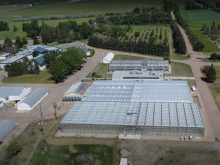Western Producer reporter Barry Wilson is visiting parts of Africa to report on how people are dealing with the food crisis.
NAIROBI, Kenya – In the early weeks of the new year, farmer Michael Macharia Kamau had some unwanted visitors.
Revenge-seeking members of a rival tribe, incensed over disputed results from the Dec. 27, 2007, national election and angry over violence against their tribe, stormed onto his farm, destroyed most of the crops and stole his livestock.
Then they went to his home in the nearby slums and ransacked it.
Read Also

Alberta crop diversification centres receive funding
$5.2 million of provincial funding pumped into crop diversity research centres
Kamau escaped by at first hiding in tall grass at the back of his farm and then by fleeing the city.
He was away during the crucial winter planting season just as the long rains were starting. As a result, it is a bad year for the 65-year-old and his urban farm within Nairobi city limits.
“It is not a good time,” he said. “We lost a lot. I don’t know if we’ll ever recover.”
Kamau is one of the lucky ones.
When the Kenya Election Commission announced Dec. 29 that president Mwai Kibaki had won the election over his political and tribal rival Raila Odinga, the losers’ supporters joined with election observers in claiming vote rigging and election fraud.
They went on a rampage, often directed against farmers in the fertile Rift Valley east of the capital.
It is considered the breadbasket of Kenya and most of its tens of thousands of farmers come from the president’s tribe.
They were targeted in weeks of violence that at times verged on civil war. More than 1,000 were killed and more than 600,000 Kenyans were driven from their farms and homes into displaced persons’ camps.
Many of the Rift Valley farms were burned and the crops destroyed. An estimated 300,000 tonnes of corn still in the field when violence broke out were destroyed or lost to the already tight food supply situation in the country.
Most of those farmers have not returned. One of Kamau’s neighbours abandoned his fields for fear of further violence.
“Farmers form the majority of Kenyan voters and were victims of ethnic clashes that erupted immediately after announcement of disputed presidential elections results,” wrote Janet Ngombalu, information manager for the Kenya National Federation of Agricultural Producers.
“The conflict destroyed the farming environment and weakened investor confidence and literally paralyzed the trading pattern within and (outside) the country.”
KENFAP also worries that the cost for displaced person resettlement could derail government promises to invest more in agriculture and rural infrastructure.
An uneasy calm has settled over Kenya after former United Nations secretary general Kofi Annan helped create a coalition government includes both political rivals.
However, tensions within the government are transparent and there is widespread unease that one incident or spark could reignite the violence.














